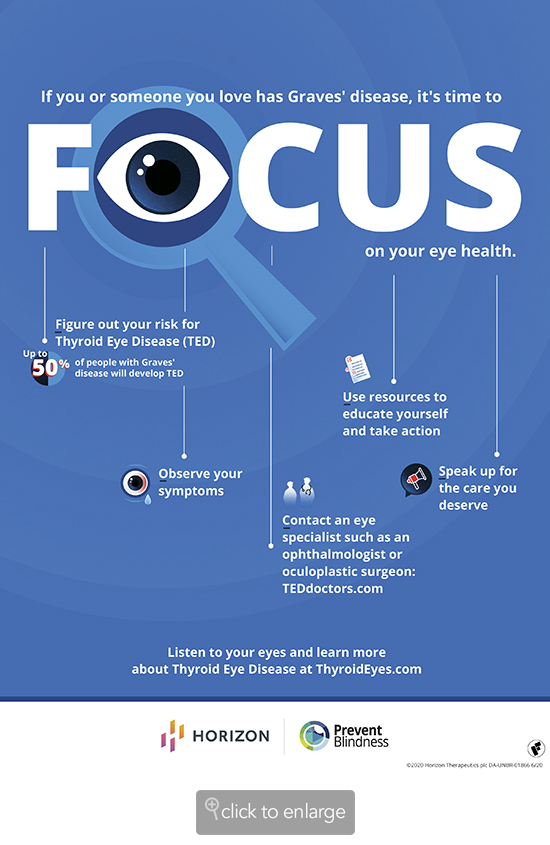Why the Graves' Disease Community Should Focus on Eye Health
Jul 01, 2020 04:31AM ● By Family Features
People living with Graves’ disease have a lot to focus on. The disease, an autoimmune disorder that causes an overproduction of the thyroid hormone, causes a variety of troublesome symptoms, many of which can happen with other diseases, leading to misdiagnosis or delayed diagnosis. Some common symptoms include anxiety, tremors, heat sensitivity, weight loss, hair loss, change in menstrual cycle and irregular heartbeat.
A related, yet separate condition that is important for people living with Graves’ to focus on is Thyroid Eye Disease (TED), a serious, progressive and vision-threatening autoimmune disorder affecting up to half of the Graves’ community. In support of Graves’ Disease Awareness Month, Horizon Therapeutics and patient advocacy organization, Prevent Blindness are working together to help people living with Graves’ understand their risk for TED and how to manage symptoms if they appear. Spotting the signs and symptoms of TED early can help decrease the chances of serious, and potentially permanent, eye damage.

If You or Someone You Love Has Graves’ Disease, It’s Time to Focus on Eye Health
The first step is to understand your risk for TED. Primary risk factors include gender, age and smoking status. Women are five times more likely than men to develop TED, but men are at greater risk for more severe symptoms. The disease also occurs most often in people between the ages of 40-49 and 60-69 years old, and people who smoke are eight times more likely to develop TED.
The next step is to observe the symptoms. TED causes inflammation and pressure behind the eyes that lead to symptoms such as sensitivity to light, a feeling of grittiness in the eyes, excessive tearing, swelling of the eyelids, redness and irritation. As the disease progresses, symptoms may include eye bulging, eye misalignment and double vision. All of these symptoms can reduce a person’s independence, ability to work and self-confidence.
“The profound physical changes to my appearance were devastating,” said Christine Gustafson, who has lived with Graves’ and TED for more than 10 years. “I did not recognize myself and actually frightened others as my face was transformed by TED. After years of living alone with this rare autoimmune disorder, I discovered a community of others with TED. Connecting with the right specialist and other TED patients was life-changing in the absolute best ways.”
Getting the Care You Need
If you have Graves’ disease and suspect you might have TED or notice changes in your eyes, you should contact an eye specialist who has experience treating TED. These include ophthalmologists, neuro-ophthalmologists and oculoplastic surgeons.
After receiving a TED diagnosis, resources can be used to stay informed and take action. For example, a symptom tracker can help monitor disease progression and alert your doctor to any changes.
It is important to be your own best advocate and speak up for the care you deserve. Tips for getting the right care include not downplaying symptoms when at the doctor’s office, asking questions to ensure all treatment options are presented, and bringing a friend or loved one along to provide support and help take notes during the appointment.
To learn more about TED and access resources like a symptom tracker and the TED Specialist Finder, visit ThyroidEyes.com.
Photo courtesy of Getty Images




